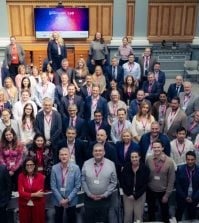Are we seeing a major shift in government data sharing?

Integrating data is notoriously difficult in government but many demonstrated in their COVID crisis response that it can be done. During a Global Government Forum webinar, public and private sector experts in four countries discussed how to take what has been achieved so far to the next level
Governments know pooling information from various departments and agencies is key to more effective evidence-based decision-making and improved service delivery. But secure and efficient data sharing has long been a major hurdle. That was until the coronavirus pandemic hit, forcing countries to find ways to integrate data in double-quick time as they raced to support struggling citizens and businesses.
The challenge now is how to take what was achieved during the pandemic and make it sustainable long-term by embedding data-sharing and privacy policies across government.
In the webinar Integrating data: how to make public sector standards stick, four experts – Estonia’s data policy director, Sandra Särav; director of Azerbaijan’s E-Gov Development Center, Fariz Jafarov; Seth van Hooland of the European Commission’s SEMIC action; and Alina Leon-Kozenko, strategic government engagement executive CEE & SSA, atonline training course provider Coursera – discussed how the lessons from governments’ crisis response can be applied in times of ‘business as usual’.
The conversation included segments on:
- Azerbaijan’s plans to create a ‘one-stop shop’ digital system whereby citizens’ information is updated automatically across all of the services they use, prompting a proactive response from government should they have become eligible for new benefits and services. (Timestamp: watch the webinar using the link above or at the bottom of this page and skip to 00.13.42 to listen to this section).
- The second phase of Estonia’s digital government programme, which involves enhancing the quality of datasets and facilitating interoperability to provide proactive services based on citizens’ life events. (Timestamp: 00.09.43).
- The use of privacy-enhancing technologies (PETs). (Timestamp: 00.08.11).
- The importance of related skills and training in the civil service – around cybersecurity, for example – and a focus on recruiting and retaining professional IT staff in a competitive market. (Timestamp: 00.57.33).
- Trust and transparency being key to the success of increased data sharing. The pandemic has shifted perceptions of how data can be used to deliver efficient public services but many citizens remain wary of sharing their data with government. The key to building trust is to continue to communicate and raise awareness of the benefits. (Timestamp: 1.00.18).
- The need for civil service leaders to be clear on the business case for updating legacy systems and to push it as a priority area for investment. (Timestamp: 00.40.00).
- Why countries whose citizens already have digital IDs will find it much easier to share data and create integrated systems for public service delivery. (Timestamp: 1.00.36).
To learn all this and more, you can watch the 75-minute webinar via our dedicated event page. The webinar – hosted by Global Government Forum with the support of knowledge partner Coursera – was held on 28 June.























